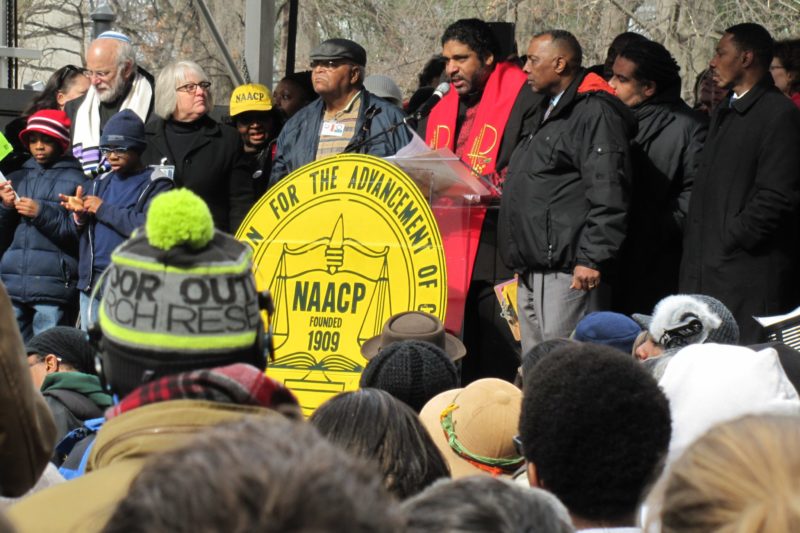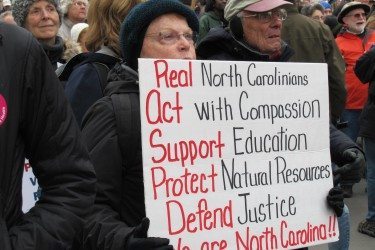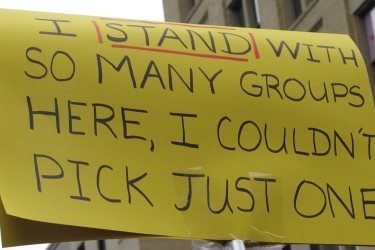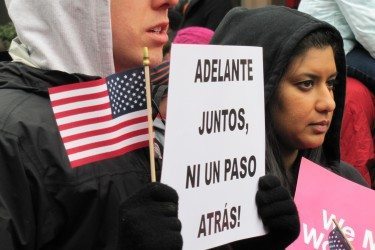‘Forward Together, Not One Step Back’: Moral March Brings Out Tens of Thousands of Progressives
The crowd, and the speakers, reflected a commitment to environmental and economic justice, to labor rights and immigrants’ rights, to public education. One hand-made sign summed up the spirit of the march: “I stand with so many groups here, I couldn’t pick just one.”

The bright sun finally broke through the clouds just as Saturday’s Moral March in Raleigh, North Carolina, was ending, drawing cheers from the tens of thousands of people who had been fired up by the Rev. William Barber’s keynote speech. “Even the universe says yes to justice!” Barber hollered joyfully from the stage in front of the state capitol. Stevie Wonder’s funk classic “Higher Ground” briefly turned Fayetteville Street into a giant dance party before the diverse, exuberant crowd began to disperse.
Barber, president of the North Carolina NAACP, had made “higher ground” a theme of his remarks, contrasting the movement’s public policy ideals with a litany of the “mighty low” policies that became law after a far-right takeover of state government in the 2010 and 2012 elections.
March organizers issued five demands for state government that reflect the broad concerns of its coalition—and the targets of right-wing leaders:
1. Secure pro-labor, anti-poverty policies that insure economic sustainability.
2. Provide well-funded, quality public education for all.
3. Promote health care for all, including affordable access, the expansion of Medicaid, women’s health, and environmental justice in every community.
4. Address the continuing disparities in the criminal justice system on the basis of race and class.
5. Defend and expand voting rights, women’s rights, immigrants’ rights, LGBT rights, and the fundamental principle of equality under the law for all people.
 Over the past year, Barber has garnered national attention as “Moral Monday” protests grew, drawing thousands of people from across the state who objected to a wave of regressive legislation; more than 900 people were arrested for peacefully protesting.
Over the past year, Barber has garnered national attention as “Moral Monday” protests grew, drawing thousands of people from across the state who objected to a wave of regressive legislation; more than 900 people were arrested for peacefully protesting.
Saturday’s march was actually a continuation of progressive organizing by HKonJ, the Historic Thousands on Jones Street (where the legislature meets), which has organized a rally every February since 2007. Last year’s merciless legislative assault on voting rights, public education, health care, and poor families gave progressive organizing a renewed urgency.
Multimillionaire Art Pope, a sort of home-grown Koch brother, had poured money into state elections. Far-right Republicans took the governorship and a supermajority in the state legislature. And in 2013 they made the most of it, gutting spending on education, rejecting the expansion of Medicaid to half a million poor people, and passing one the worst anti-voting laws in the country. They raised taxes on poor people by abolishing the Earned Income Tax Credit for almost a million families and used the savings to fund new tax breaks for a handful of the state’s richest residents. The governor violated a campaign pledge by signing a law that further restricts access to abortion.
North Carolina became, in short, the proving grounds for an untrammeled Tea Party approach to governance and what Barber calls “extreme, constitutionally inconsistent, morally indefensible, economically insane policies.”
Rev. Nancy Petty, who leads Pullen Memorial Baptist Church in Raleigh, said the first task of the Moral Mondays movement was to make sure that North Carolinians understood how much harm their legislators were doing. And that has energized a lot of people. As a speaker at a Friday night worship service said, it’s Bluto who makes Popeye reach for his spinach.
The crowd at Saturday’s march reflected the diversity of the coalition’s partner organizations and its commitment to the theme “Forward Together, Not One Step Back.” Visible groups included hundreds of doctors and other medical professionals in white coats, a sea of Planned Parenthood supporters in neon pink, Delta Sigma Theta sorority sisters in bright red, and more than a thousand Unitarian Universalists in yellow “Standing on the Side of Love” campaign  gear. The crowd, and the speakers, reflected a commitment to environmental and economic justice, to labor rights and immigrants’ rights, to public education. One hand-made sign summed up the spirit of the march: “I stand with so many groups here, I couldn’t pick just one.”
gear. The crowd, and the speakers, reflected a commitment to environmental and economic justice, to labor rights and immigrants’ rights, to public education. One hand-made sign summed up the spirit of the march: “I stand with so many groups here, I couldn’t pick just one.”
What holds the broad coalition together is a vision that is firmly grounded in moral language and an appeal for public policy that reflects the “better angels of our nature.” Justice, Barber says, is what love looks like in public.
Janet Colm, who has been CEO of Planned Parenthood of Central North Carolina for 30 years, said Moral Mondays organizing has been “transformational.” In a conversation a few days before the march, she said the onslaught of right-wing legislation had encouraged people to broaden their focus from any particular issue to the people being affected by the actions of those in power.
 “The progressive movement in North Carolina is moving away from thinking this is about women’s rights, or unemployment, or Medicaid, and thinking about it as an attack on women, young people, people of color,” she said. “There’s a lot of power in that.” There may be disagreements on some organizational positions and nuances, she says, but “people know we are fighting for the same people.”
“The progressive movement in North Carolina is moving away from thinking this is about women’s rights, or unemployment, or Medicaid, and thinking about it as an attack on women, young people, people of color,” she said. “There’s a lot of power in that.” There may be disagreements on some organizational positions and nuances, she says, but “people know we are fighting for the same people.”
Barber makes the case by drawing on the language of scripture and hymns familiar to many people of faith, and also on the language and promise of the U.S. Constitution. “We stand together,” he said, “to lift up and defend the most sacred principles of our democracy.”
After the rally, Barber reflected on the response the movement has generated, saying, “There is a hunger for higher ground, there is a hunger for language that is not limited” to partisan divides, “a language that allows people to dig deeper into their humanity, to get beyond just the talking heads and pundits and to really ask the question, what are our deepest moral values that grow out of our faith?”
Indeed, a big part of the excitement generated by the Moral Mondays movement is the sense that it has succeeded in retaking moral high ground that has been claimed for too long by the religious right and its political allies. Rally speaker Manzor Cheema, who was representing Muslims for Social Justice, credited the movement “for taking the world ‘moral’ out of the right wing and giving it back to the progressive people.”
A strong interfaith presence is one feature of the Moral Mondays movement; another is the full inclusion of reproductive justice and women’s health care and the equality of LGBT people.
“That’s a journey,” said Rev. Petty, a lesbian who was a master of ceremonies at Saturday’s rally. Petty told me that she and Barber first worked together closely in 2010 when he contacted her after seeing an op-ed she had written challenging the school board’s effort to roll back desegregation policies. “From that moment, we joined hands, not as black and white, gay and straight, but as two faith leaders who saw something at stake in North Carolina, our state being a compassionate state, where people are treated equally, where diversity is respected and welcomed.”
They worked together on the education issue, she said, without ever talking about LGBT equality. And when Amendment One was put on the 2012 ballot to write a ban on marriage by same-sex couples into the Constitution, Barber was there as an advocate for equality. “When you stand in solidarity with someone on a justice issue,” Petty said, “when the next justice issue comes down, you stand with them. Because now you’re connected, and you’re connected on something bigger than you.” When you’re working on justice, she said, “you don’t get to pick and choose issues.”
Throughout the weekend, Barber repeated his belief that the movement must never stray from the fundamental constitutional principle of equal protection under the law—a principle that puts voting rights, LGBT equality, access to health care, and class and racial inequities in the justice system in the same moral frame.
Organizers say that Forward Together is “not a moment, but a movement,” and that the rally kicked off what will be a year of intensive grassroots organizing, litigation, nonviolent direct action, and voter empowerment and voter education. In the days leading up to the march a group of youth leaders from around the country met to strategize for a new Freedom Summer, 50 years after the original, to mobilize young people from across the country to register voters in North Carolina and other states.
Barber insists that the Forward Together movement is not partisan; many Republicans and Independents joined Democrats in protesting the extreme policies put into law last year. He reminds critics that the Historic Thousands on Jones organizing began when Democrats were in charge, and cites examples of Republicans in the past who worked across the aisle to advance the common good.
Even though its leaders have a clear eye on the 2014 elections, the movement keeps principles, not politicians, in the forefront—literally. As the pre-march rally wrapped up and organizers were giving instructions on the logistics of the march itself, Barber invited clergy, leaders of partner organizations, and youth to come to the front. “Elected officials,” he instructed, “do not come to the front of the line … we don’t do that.”
Also not at the front of the line, and for the most part not on the speakers’ platform, were national figures. Barber is adamant that the change the country needs must come from state-based movements led by local people. The Grand Marshalls of the march were three women from North Carolina who are lead plaintiffs in the North Carolina NAACP’s voting rights suit against the state: Carolyn Coleman, an NAACP national board member; Mary Perry, who Barber said has registered 10,000 voters; and the 92-year old Rosanell Eaton, who led the crowd in chants of “Fed up, fired up!”
 Some national leaders did join Barber at a post-march press conference, where they pledged to support the movement without trying to impose leadership or agendas from Washington or elsewhere. Among those present were Randi Weingarten of the American Federation of Teachers, Penda Hair of the Advancement Project, George Gresham of 1199 SEIU, Peter Morales of the Unitarian Universalist Association, and Geoffrey Black of the United Church of Christ. Several of them choked up talking about what is happening in North Carolina as a revival of the spirit and activism of the civil rights movement.
Some national leaders did join Barber at a post-march press conference, where they pledged to support the movement without trying to impose leadership or agendas from Washington or elsewhere. Among those present were Randi Weingarten of the American Federation of Teachers, Penda Hair of the Advancement Project, George Gresham of 1199 SEIU, Peter Morales of the Unitarian Universalist Association, and Geoffrey Black of the United Church of Christ. Several of them choked up talking about what is happening in North Carolina as a revival of the spirit and activism of the civil rights movement.
Movements happen, says Barber, from the bottom up. When I asked him about the national interest in Moral Mondays, Barber said it is wrong to think in terms of taking the movement national. The United States was changed from Selma and Montgomery, not from Washington, D.C., he says. Activists in other states are already adopting and adapting the model. “We didn’t have to tell Georgia to start Moral Mondays,” he said. “Gov. [Nathan] Deal did that” by denying people Medicaid and attacking voting rights. “They caught the spirit.”
“When people understand the intersectionality, the coordinated attacks against our most fundamental rights, people come together,” Barber said. “And when they see something working, then they join in.”
All photos via Peter Montgomery.
